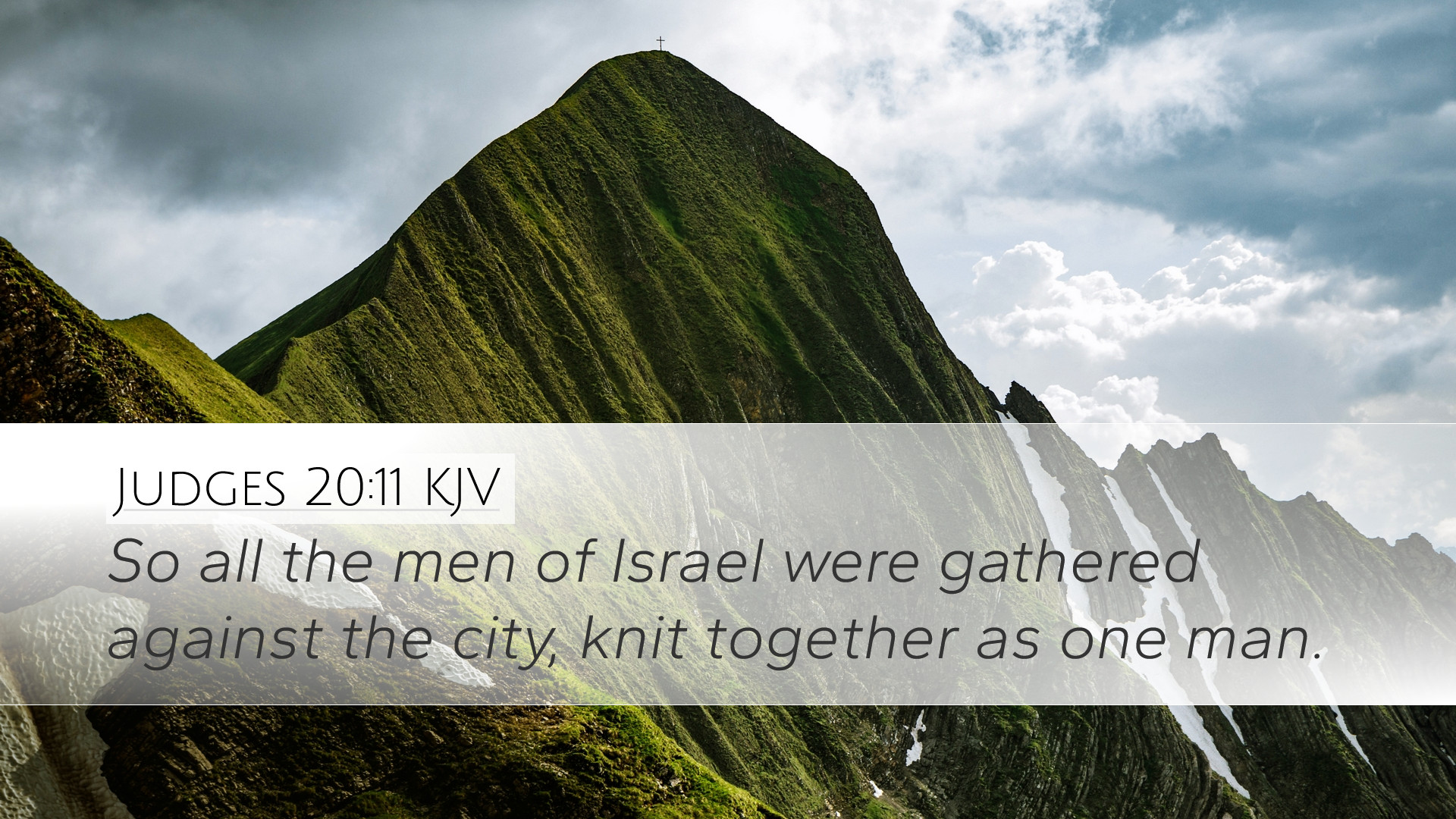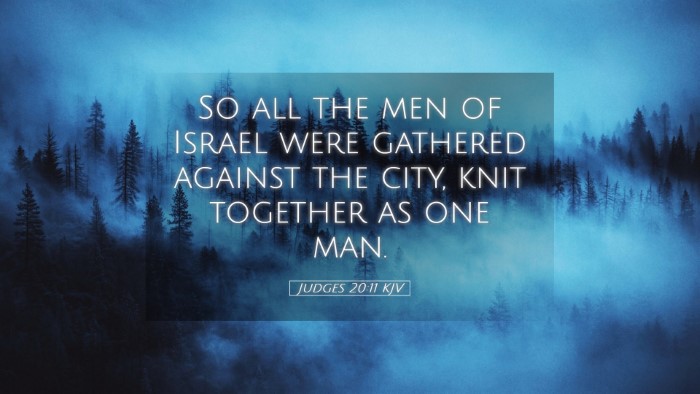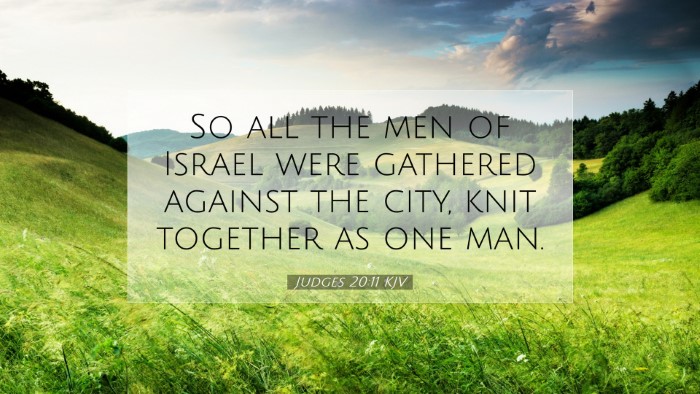Commentary on Judges 20:11
Introduction
This verse, Judges 20:11, is situated within a turbulent narrative in the book of Judges, capturing a pivotal moment amidst civil strife in Israel. The verse states: "So all the men of Israel were gathered against the city, knit together as one man." This gathering reflects not only the unity of purpose among the Israelites but also underscores the severity of the conflict at hand. To unravel this text's implications, insights from various esteemed public domain commentators, including Matthew Henry, Albert Barnes, and Adam Clarke, shall be synthesized.
Contextual Analysis
To appreciate the depth of Judges 20:11, we must first recognize its context within the wider narrative of Judges. The preceding chapters recount the grievous sin of the men of Gibeah, which led to a cry for justice among the tribes of Israel. Such background lays the groundwork for understanding the collective response that follows.
Matthew Henry's Insight
Matthew Henry emphasizes the significance of unity in combating evil, illustrating that the gathering of Israelite warriors reflects their commitment to address wrongs done in their nation. He notes, "Their hearts were knit together in a sincere endeavor not only for vindication of God's glory but for the welfare of their people." This notion of unity is paramount; in a time of chaos, the cohesion of these tribes reveals a profound solidarity rooted in shared values and moral obligations.
Albert Barnes' Perspective
Albert Barnes draws attention to the practical implications of such unity. He observes that the term "as one man" indicates a complete resolve among the tribes to confront a great wrong. "It was not a mere gathering of numbers; it was a profound assembly of hearts and minds aligned in purpose," Barnes elaborates, underlining how this collected force was directed to rectify the sin of Gibeah. His commentary invites readers to reflect on the power of collective action rooted in righteousness.
Adam Clarke's Exposition
Adam Clarke contextualizes this gathering by highlighting the seriousness of the offense that prompted such a response. He notes, "The atrocity of the crime committed in Gibeah created a cathartic response among the Israelites, compelling them to unite against their fellow tribesmen who transgressed the covenant." Clarke emphasizes that this situation reveals the delicate nature of communal relations among God's chosen people, illustrating how deeply sin can wound a community.
Theological Implications
The theological ramifications of Judges 20:11 extend beyond mere historical record; they invite reflection on broader themes of unity in the church, justice, and accountability.
Unity Amidst Diversity
The gathered Israelites, reflecting diverse tribes, represent the body of Christ—a community brought together from various backgrounds for a common purpose. As indicated by Matthew Henry, their oneness is not merely an act of military organization but a manifestation of spiritual kinship grounded in divine covenant. This speaks to the church today, where unity is paramount against moral and spiritual crises.
Justice and Accountability
Albert Barnes reminds readers that God's justice must be reflected in human actions. The mobilization against Gibeah signifies a commitment to righteousness that transcends personal allegiance to family or tribe, calling for accountability on a national scale. For pastors and theologians, this places a responsibility on the church to address sin within its ranks while encouraging accountability and restoration purposes.
The Danger of Inaction
Adam Clarke's examination of the context shows the risk of passivity. The failure to respond decisively to sin allows for further corruption to take root. This is a relevant warning for contemporary believers who may shun difficult conversations about sin and justice within their communities. The gathering signifies a proactive stance, essential in the life of the church—a call to confront evil in whatever forms it may appear.
Practical Applications
The principles drawn from this verse yield several applications for today’s believers:
- Encouraging Unity: Like the men of Israel, believers must prioritize unity, emphasizing the necessity to stand together against societal evils.
- Promoting Accountability: Spiritual leaders must not hesitate to address sin within their congregations and promote a culture of accountability, which is vital for the overall health of the body of Christ.
- Cultivating a Collective Responsibility: Just as the tribes banded together for a righteous cause, modern believers are called to advocate for justice and righteousness within their communities, actively participating in the work of restoration.
- Engaging in Prayer and Action: In response to the injustices and issues facing society, Christians should engage in prayerful action, fostering the spirit of togetherness in pursuing what is right.
Conclusion
In reflecting on Judges 20:11, we find rich insights into community dynamics, the seriousness of sin, and the necessity of concerted action to uphold righteousness. Matthew Henry, Albert Barnes, and Adam Clarke provide illuminating commentary that resonates with contemporary spiritual practices and challenges. As pastors, students, theologians, and scholars delve deeper into this scripture, may they be inspired to embody the unity and determination demonstrated by the men of Israel in the face of moral decline, recognizing their collective responsibility in the pursuit of justice within the framework of God’s covenant. The call remains: to act as one, in faith and righteousness, against the evils that seek to disrupt the God-given order.


